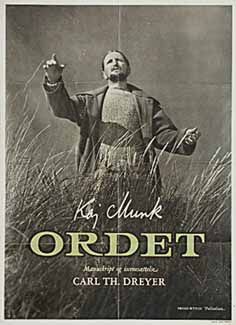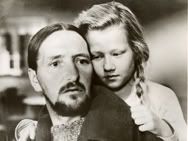
1954
I'd like to know if anyone actually read this review. if so please make a comment?
I love foreign cinema and occasionally I enjoy reviewing old films from Germany, France, Italy or Japan, or other countries. See my film review page. My favorite kind of film is one that takes on a big question, the kind of question religious belief is about answering, through the perspective of modern thought and film making. My favorite director is Ingmar Bergman, for his quasi religous (even though he was an atheist) films such as The Seventh Seal, the Virgin Spring, Winter Light.
I've been searching for another director who would have that same kind of theological bent in a modern film package. I recently found one in Carl Dreyer (1889-1968). While Berman was a Swede Dreyer was Danish, and is very different from Bergman yet they both share that same Nordic kind of theater tradition that adds an element of stinginess and pageantry to their films. While they are very different they also at times remind me of each other. One Dreyer film that really made me feel I was watching a Bergman movie was his work "Ordet." Ordet means "the word." It's based upon a 1920s Danish play and is set in the 20s (although the film was made in 1954). It's about a family that has a son a who thinks he is Jesus.
Cast
| Uncredited cast: | |||
| | Hanne Agesen | ... |
Karen, a Servant (uncredited)
|
| | Kirsten Andreasen | ... |
(uncredited)
|
| | Sylvia Eckhausen | ... |
Kirstin Petersen (uncredited)
|
| | Birgitte Federspiel | ... |
Inger, Mikkel's Wife (uncredited)
|
| | Ejner Federspiel | ... |
Peter Petersen (uncredited)
|
| | Ann Elisabeth Groth | ... |
Maren Borgen, Mikkel's Daughter (uncredited)
|
| | Emil Hass Christensen | ... |
Mikkel Borgen (uncredited)
|
| | Cay Kristiansen | ... |
Anders Borgen (uncredited)
|
| | Preben Lerdorff Rye | ... |
Johannes Borgen (uncredited)
|
| | Henrik Malberg | ... |
Morten Borgen (uncredited)
|
| | Gerda Nielsen | ... |
Anne Petersen (uncredited)
|
| | Ove Rud | ... |
Pastor (uncredited)
|
| | Susanne Rud | ... |
Lilleinger Borgen, Mikkel's Daughter (uncredited)
|
| | Henry Skjær | ... |
The Doctor (uncredited)
|
| | Edith Trane | ... |
Mette Maren (uncredited)
|
Two fmailies, the Borgen family, whose second son,Johannes Borgen, played by Preben Lerdorff Rye thinks he's Jesus, and the Peterson family, whose daughter Anne the youngest son of the Borgen's, Anders, loves and wants to marry. The two families have been feuding for years over religion. The Borgen represent the modern liberal happy chruch kind of people who think religion is positive, but rationalistic. The Peterson's represent a more old fashion kind of sever dawyer always alarmed faith based upon German Pietism. They are not Penticostal, they would not get excited in worship but would act somber. one group thinks everyone should be happy, but responsible and moral, the other groups thinks we should all be afarid, alarmed, ashamed and somber.
We first see Johannes when he's wondered off into the cliffs and shouts down at the village "the word came into the world and the world received it not." he stands there shouting prophesies of doom on the unbelievers the other family members go out and bring him in. Rye's performance is excellent. He actualy looks a bit like the guy on the shroud of Turin. He speaks in a whining voice and always greets people "God beleeeeeessssss youoooooo." Anytime there's a dramatic movment and the old grandfather is contemplating the issues we hear that whining "Gawd Beleeeeeessssss youoooooo" we know there's going to be some comic relief. Once Johannes lights two candles and sets them on the window ledge. His sister-in-law, Inger wife of oldest son Mikel asks "why did you put the candles there?" He Johannes answers "so that my light will shin in the darkness." Everything he says is right out of the red letter bible, the words of Jesus. Even if it's an answer to mundane question me makes it fit.
The minister comes to visit and introduces himself to Johan and Johan replies "don't you recognize me? I am Jesus of Nazareth." At that point we learn that he was a seminary student driven mad by reading too many books (he must have gone to Perkins). We find that it was primarily Kierkegaard who dorve him over the edge. He is the personifiication of SK's attack on Christendom, right out of the pages of the book. Everything he says has two meanings, one an answer to the mundane counted in nutty sounding Biblical quotation form Jesus, and the other a hinted application to the higher issues of the plot. Of course no one takes him seriously because he's just the crazy guy. Everyone pities him but no one listens to what he's saying. What he's saying inceently, as did Keirkegaard, "you profess faith but you don't believe it." All the other characters say nuttie things, they all exhibit paranoia and magical thinking, or an ordinary kind, but the implication is there that the problem is everyone in the society is revved up on religious anxiety without the actual faith to turn into something positive. Becuase they don't go around saying they are Jesus or answering every question with a quotation form the Bible no one thinks they are nuts.
Anders goes to Anne's parents and asked to Marry her. They refuse him. There is a sub plot his mother gaining his grandfather's approval. The two old men, the grandfathers of both families have been at each other for years, becasue one is for the happy chruch one is for the somber upset chruch. They discuss the issue in a special meeting in the girls home and come to actual blows. The stage humor is amusing that they meet in "Christian love" and wind up brawling.
At this point they are sent word that Inger is about to have her baby but she's sick. Something is wrong and her life is in danger. They go home and everyone is tense and praying. The doctor is working hard. The Jesus son is in the back room talking to hi young niece. He tells her "it's better to have a mother in heaven becuase then she will be always with you. On earth she has too many things to think about." The girl decides she wants her mother with her. He says "I can't bring her back (he's not gone yet) because they wont let me." He keeps quoting the passage about Jesus couldn't do many mighty works in his home town because of unbelief. In one scene the grandfather is talking out loud to himself about how God is doing this to punish him. Johannes is walking behind him, packing back and forth. He's saying detached nuttie things and the Grandfather is saying "not now." But Then things Johannes says start making sense plot wise. They are like informing him of his unbelief and how this is effecting the situation. The Granfather is sort on the surface saying "go away you are nut but he also starts talking to him as though he's really God. part of the time he's answering back going "why do you allow these trials" while the rest of the time he's saying "you are a nut." This is a perfect metaphor for the point of the play that their faith is double minded. It's a real Kierkegaardian theme that their belief is shallow and social and not interlinked.
The doctors thinks the woman will pull throw and now she's resting. He and mintier sit and have a little confab about God and the reality of miracles and they reduce miracles to science and decide that God works only thought he natural he's given them the ability to solve everything. They are the rationalists. The doctor represents modern secular view of scinece, the minister the modern ratinalisit view of the chruch. When they leave Johannes comes right out and says "the man with the hourglass is back. he's going through the wall to see Inger." They shush him "that's the doctor's car lights on the wall as he turns around." No sonner does the doctor drive away the the Miekkel comes out and says he died! Johannes again tells the little girl "i can't raise her because they wont let me." He leaves in the middle of hte night. His note says "where I go you cannot come" a quotation form John that Jesus told Mary Magdeline in the resurrection scene. They go looking for him for the next couple of days.

Uncle and niece
They don't find Johannes and they wind up at the funeral. It's time to seal the casket and here comes Johannes. He's talking normally. The father says "you have come to your senses!" He says yes father I've come to my senses. Now I realize that the child's faith is all I need, referring to his young niece. The first comes over and says "you have to do it now Uncle." So he says "in the name of Jesus rise" and the woman comes back to life. He tells them "you never thought to ask God to restore her life because you only half believe your faith. The ending I'm told is in a tradition of Danish theater where they seem very stylized and not realistic in their reactions. I say this because in real life they would be running around in shock but in the film they act like "I won ten dollars in the drawing, that's nice." The minister and doctor are shot panned away from we don't even see their reactions.
The whole thing is so totally Kirkegaaridan it's a joy to watch, if you are a SK fan like me. The family dynamic, the superstitious nature of their faith, is the issue. Its' not saying that all belief in God is superstitious it's saying that the way they use their faith as a protection against misfortune but don't really believe God's promises makes it superstitious like. The son who so closely identities with Jesus that he starts thinking he is Jesus is regarded as a nut but the one's who have no faith and yet cling to a rationalized version of faith are credited with sanity when in reality they are less aware of the true import of things than the "nut case" son.

2 comments:
Well, I was going to read it but it was sounding really familiar, & I realized it was something you'd posted before & I'd read before. Does that count as reading it? :)
Take care & God bless
Anne / WF
as long as you clicked on it so I get the count. sorry to post a recycled film review. I had plans to review a film that I didn't get a chance to see.
Post a Comment